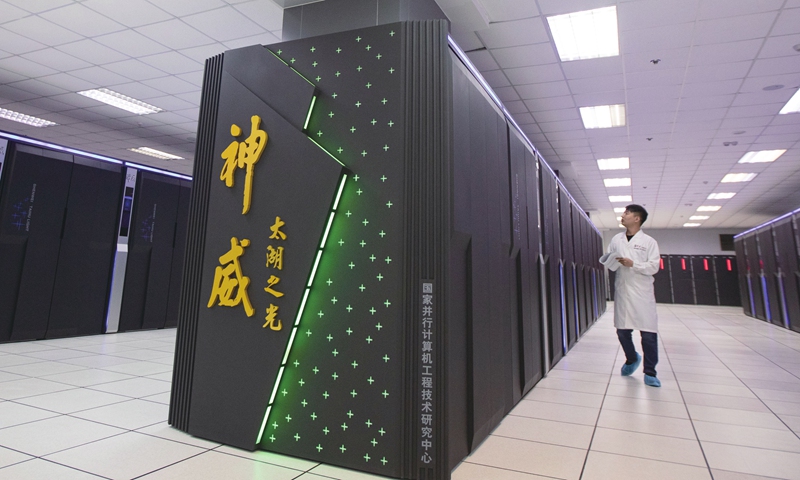
A scientist works at the National Supercomputing Center in Wuxi, East China’s Jiangsu Province in August 2020. Photo: cnsphoto
The US is once again feeling anxious about supercomputers, a strategic emerging industry. The Wall Street Journal recently published an article stating that China is getting "secretive" about its supercomputers. According to the article, Chinese scientists have become more secretive and have stopped participating in the TOP500 forum, making it harder for the US government to know who has faster supercomputers between China and the US. In the latest TOP500 ranking released in June, the US dominated the top three spots and held half of the top 10, while China's "Sunway TaihuLight" ranked 13th and "Tianhe-2A" ranked 16th. This significant disparity in rankings has made the US suspicious, fearing that China is engaged in a supercomputing "covert war" against it, thus accusing China of hindering international supercomputing exchanges by keeping secrets.
This is not the first time the US media has stirred up this topic. Two years ago, Voice of America published an article asking, "Why is China, which leads in supercomputing, being so secretive?" The US' suspicion and anxiety are not surprising. From 2010 to 2019, China topped the TOP500 list 11 times out of 20 evaluations, and the US started to launch wave after wave of chip bans and entity list sanctions against Chinese supercomputing institutions under the pretext of "national security." As a result, China's presence in the TOP500 rankings has dimmed. Initially, US media were pleased that China had opted out and relinquished the top spot. However, in recent years, speculation about how much strength China is hiding has grown. TOP500 co-founder Jack Dongarra repeatedly stated that China has faster supercomputers, even speculating that China's supercomputer power may exceed all other countries.
Setting aside China's progress in supercomputing, the key issue is that while the TOP500 list increasingly serves as a tool for the US Department of Commerce to sanction and suppress Chinese supercomputers, they still expect Chinese institutions to willingly participate and be targeted. This is unreasonable. Supercomputing was once a field where China and the US had close technological cooperation and exchange. However, now the landscape of international supercomputing exchanges is filled with pitfalls, primarily due to the US' near-terroristic sanction measures to maintain its technological hegemony.
In April 2021, the US Department of Commerce added seven Chinese supercomputing entities to the so-called "Entity List," alleging that they were "destabilizing military modernization." In October 2023, another 13 Chinese entities were added to the "Entity List," on the grounds that their involvement in the development of advanced computing integrated circuits "can be used to provide artificial intelligence capabilities for the further development of weapons of mass destruction, advanced weapons systems, and high-tech surveillance applications that create national security concerns." China's development of supercomputing technology is often labeled as a "threat to US national security" and subjected to unreasonable unilateral sanctions. Therefore, it is quite natural for Chinese scientists to refrain from attending international supercomputing forums, as they need to guard against the possibility of the US engaging in "entrapment" under the guise of long-arm jurisdiction during international technical exchanges.
"Entrapment" is by no means an alarmist term. The global TOP500 supercomputing rankings are updated every six months, and supercomputers from China, Japan, and the US have all claimed the title of "world's fastest supercomputer." However, in recent years, China's leading supercomputing companies have refrained from participating in the TOP500 rankings because companies that perform well on this list risk being blacklisted by the US and facing even harsher sanctions. With Washington wielding a big stick of sanctions at the door, constantly watching whose supercomputing performance threatens the US position and then sanctioning them, it has severely disrupted normal academic exchanges and a healthy competitive environment.
As for The Wall Street Journal's accusation that "Chinese scientists also reduced how much data they shared in other scientific forums," this is a clear double standard. The important fact not mentioned in the article is that the US is even more "secretive" than China regarding supercomputing technology. In addition to sanctioning Chinese supercomputing companies, Washington now even sanctions Chinese supercomputing academic conferences. The US Department of Commerce sends unified emails to foreign companies, warning them not to participate in or support supercomputing conferences held by China. In fact, Chinese experts still participate in some international supercomputing conferences, while many American experts no longer dare to communicate with their Chinese counterparts for fear of being accused of "leaking secrets" or even "espionage." Currently, US administrative orders and regulations that restrict and suppress China's high-tech industry are beginning to produce a McCarthy-era-like chilling effect. This has seriously damaged the atmosphere of China-US technological exchanges and hindered the progress of science and technology for all humanity.
Supercomputing plays an important role in many fields, such as weather forecasting, gene sequencing, materials design, and pharmaceuticals. It should not become "central to the US-China technological Cold War" as described by The Wall Street Journal. Some Western scientists have expressed concern about the potential division, believing it will slow down the development of AI and other technologies. It is important to emphasize that the key to preventing this division is to jointly resist the technological unilateralism and technological terrorism of the US, creating a good atmosphere for global scientific exchange and cooperation. China's supercomputing is not an untouchable "secret," but the key is for the US to abandon its well-known habit of technological intimidation.
